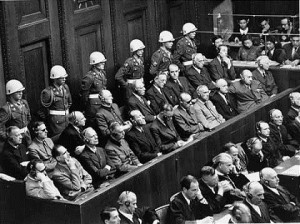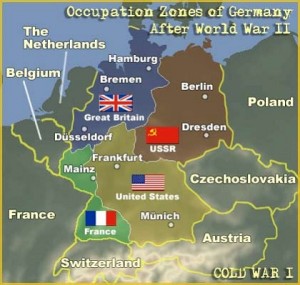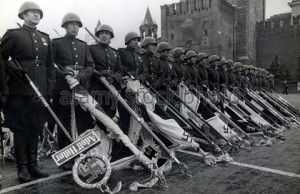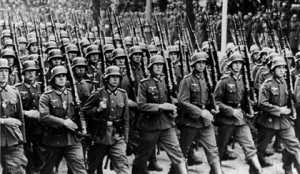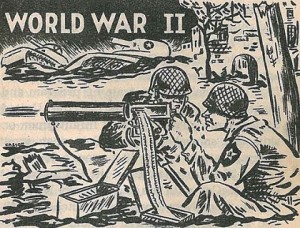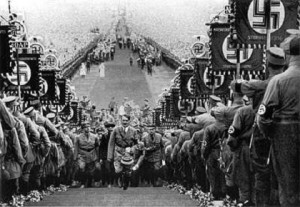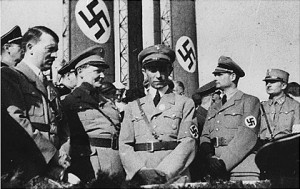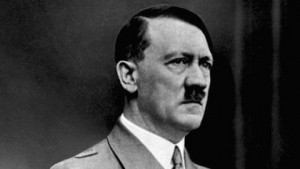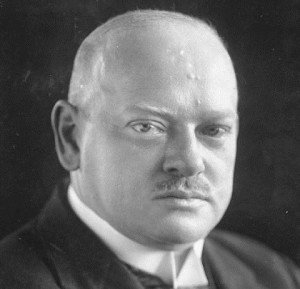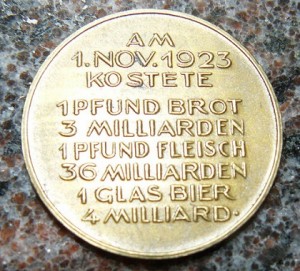The Allies agreed that Germany should never again have the opportunity to destroy European peace as it had in the two world wars. A principal aim of the Allies was to prevent the resurgence of a powerful and aggressive Germany. As a first step toward demilitarizing, denazifying, and democratizing Germany, the Allies established an international … [Read more...]
Postwar Occupation and Division of Germany
On May 8, 1945, the unconditional surrender of the German armed forces (Wehrmacht) was signed by Field Marshal Wilhelm Keitel in Berlin, ending World War II for Germany. The German people were suddenly confronted by a situation never before experienced in their history: the entire German territory was occupied by foreign armies, cities and … [Read more...]
World War II – Defeat
In June 1944, American, British, and Canadian forces invaded France, driving the Germans back and liberating Paris by August. A German counteroffensive in the Ardennes began in late December was beaten back after heavy fighting in what became known as the Battle of the Bulge. Soviet troops, meanwhile, advanced from the east. Western forces reached … [Read more...]
Total Mobilization, Resistance, and the Holocaust in Germany
Once it became clear that the war would not be a short one, Germany's industry was reorganized for a total mobilization. Between February 1942 and July 1944, armaments production increased threefold despite intense Allied bombing raids. Much of the labor for this increase came from the employment of some 7 million foreigners, taken from their … [Read more...]
The Outbreak of World War II
On September 1, 1939, German troops invaded Poland. Britain and France declared war on Germany two days later. By the end of the month, Hitler's armies had overrun western Poland. Soviet armies occupied eastern Poland, and the two countries subsequently formally divided Poland between them. In April 1940, German forces conquered Denmark and Norway, … [Read more...]
The Third Reich: Foreign Policy
Once his regime was consolidated, Hitler took little interest in domestic policy, his sole concern being that Germany become sufficiently strong to realize his long-term geopolitical goal of creating a German empire that would dominate western Europe and extend deep into Russia. In a first step toward this goal, he made a de facto revision to the … [Read more...]
The Third Reich: Consolidation of Power
Hitler rapidly transformed the Weimar Republic into a dictatorship. The National Socialists accomplished their "revolution" within months, using a combination of legal procedure, persuasion, and terror. Because the parties forming the cabinet did not have a parliamentary majority, Hindenburg called for the dissolution of the Reichstag and set March … [Read more...]
Hitler and the Rise of National Socialism
Adolf Hitler was born in the Austrian border town of Braunau am Inn in 1889. When he was seventeen, he was refused admission to the Vienna Art Academy, having been found insufficiently talented. He remained in Vienna, however, where he led a bohemian existence, acquiring an ideology based on belief in a German master race that was threatened by an … [Read more...]
The Stresemann Era in Weimar Republic
Gustav Stresemann, a German politician and statesman who served as Chancellor in 1923 (for a brief period of 102 days) and Foreign Minister 1923–1929, during the Weimar Republic. He was co-laureate of the Nobel Peace Prize in 1926. Stresemann was a Vernunftrepublikaner, that is, someone who supported the Weimar Republic because it seemed the best … [Read more...]
Problems of Parliamentary Politics in The Weimar Republic
The Weimar Republic was beset with serious problems from the outset that led many Germans either to withhold support from the new parliamentary democracy or to seek actively to destroy it. The extreme left and much of the right provided the republic's most vitriolic opponents. Its supporters included the bulk of the left, represented by the SPD, … [Read more...]
- « Previous Page
- 1
- …
- 4
- 5
- 6
- 7
- 8
- …
- 13
- Next Page »
